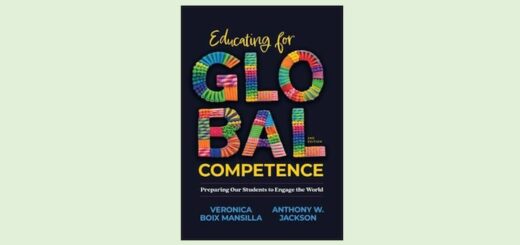Turn Writers Workshop Into a Maker Space
Make Writing: 5 Teaching Strategies That Turn Writers Workshop Into a Maker Space
By Angela Stockman
(Times 10 Publications, 2016 – Learn more)
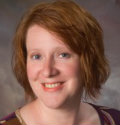
As a self-proclaimed (and easily verified) “word nerd,” the first time I heard the title of Angela Stockman’s book Make Writing: 5 Teaching Strategies That Turn Writer’s Workshop Into a Maker Space, I was intrigued. I love odd verb and noun combinations.
I’ll say to students, “You just need to learn how to do school.” I like to hear combinations like time crunch and gaming the system. The word workshop was equally compelling to me many years ago as Nancy Atwell turned a noun into a verb, impacting generations of writers, and Atwell’s influence is felt throughout Make Writing.
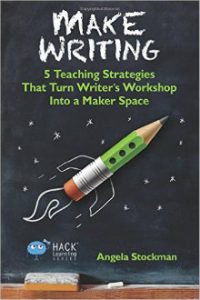
I’ll be the first to admit that “making” has not been a focus of mine, but as I read, I found the familiar principles of a Project Based Classroom that drive my instruction: students need to be engaged, they need authentic audiences, and they need differentiation.
Just as a Project Based Classroom can seem like a chaos zone if you simply read about it, “making writing” sounds amorphous at best, and a time suck at worst. However, Stockman thinks like a teacher because she is one, and addresses the fears and critique of this approach with a nurturing “What You Can Do Tomorrow” section to each chapter.
Stockman’s expertise comes from her real brick and mortar, thriving writer’s studio in Western New York where students and teachers learn together, and “making writing” happens in the most magical ways.
I’m lucky enough (full disclosure) to both live in Western New York and have two children who attend what we call “studio.” In a cozy room within an old church, Angela runs the studio where the very ideas in this book are tried out and reflected upon.
My son and daughter are quite different learners and writers, so it was interesting to see how they both embraced a way of approaching writing that tapped into something they didn’t know could be a part of the writing process: making.
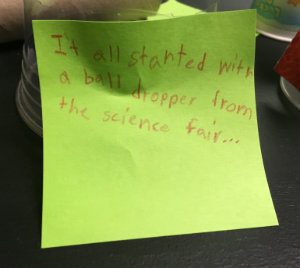
This is particularly noteworthy to me because one of the limitations of young writers is that they are simply mimics, which is okay, obviously, to a point. However, I’ve been trying to get him to move past Star Wars battles and the flippant narrators of James Patterson’s Middle School: The Worst Years of My Life.
Zoey, on the other hand, is much more cerebral. She is science and musically minded, and immediately wanted to create a prototype of an instrument, which was one of the suggestions Angela had on laminated idea sheets called “Challenge Cards.”
I was especially curious how this could turn into writing, as it didn’t seem to lend itself to a story. That’s when it occurred to me. I have a huge bias that children should write fiction. Why? Because that’s what I’ve experienced. But, as Angela’s book shows us, the concept of making stands in direct contradiction to formulaic writing, in large part because a wide array of tools are utilized.
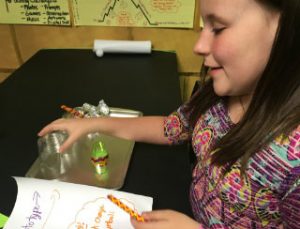
“Give them permission to think about what they should do to plan and execute their ideas successfully and let them decide how to proceed.”
“Ask which tools might support their efforts best, and think carefully before you require the use of specific devices, resources, or writing instruments.”
She inspires us to think differently
Angela Stockman’s attitude of respect and awe for students exudes from the page and inspires teachers to think differently about their approach to writing and writers.
Any teacher who has written a topic on the board, required 5 paragraphs with 6 sentences each (typed and double spaced), and demanded a minimum of two sources from a database, please go buy this book. I can say this to you because, despite all of my PBL ideas, I can slip into exactly that kind of on-command writing that has shown limited effectiveness in past assessments. Not only will this book improve your students’ writing, it will also free you from constraints that kill the spirit of young writers.
Angela ends her book on a personal note, one that I believe will resonate with veteran teachers. She explains, “I often wonder how many writers I silenced by expecting them to sit and stare at paper and screen when I was still in the classroom. I wonder how many more I could have inspired if I only knew then what I am coming to know now.”
No matter who you are, or what you teach, we all know that teachers wield this kind of power. Take this time this summer to reflect on ways you can make writing with your students next year. This book can really help.
Amber Chandler is a National Board Certified Middle School ELA teacher and author of The Flexible ELA Classroom: Tools for Differentiation 4-8 out in September 2016. She is a regular contributor to MiddleWeb, ShareMyLesson, GettingSmart, and AMLE Magazine. Amber’s workshops on Differentiation, Danielson’s Domains, and Project Based Learning are all designed to create a student-centered classroom. Follow her on Twitter @MsAmberChandler and checkout her website doyoudifferentiate.com for teaching resources.


































